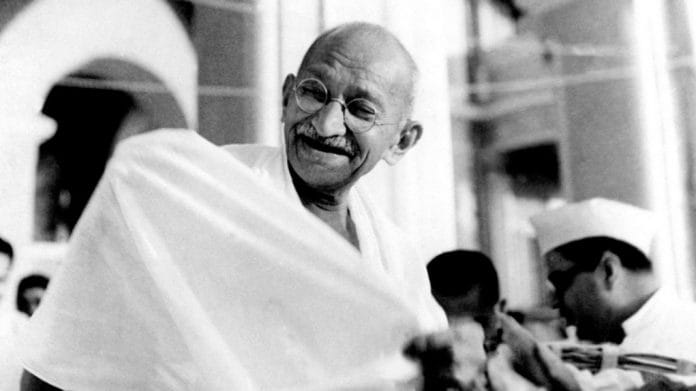Thank you dear subscribers, we are overwhelmed with your response.
Your Turn is a unique section from ThePrint featuring points of view from its subscribers. If you are a subscriber, have a point of view, please send it to us. If not, do subscribe here: https://theprint.in/subscribe/
Star Trek’s theme of Governance involved AI, Video Surveillance, and Computerization coexisting with human/alien values with autonomy, and moral responsibility while striving to create a society where resources, opportunities, and power are distributed equally, ensuring that technological progress benefits all members of society.
Mahatma Gandhi, revered as the “Father of the Nation,” played a pivotal role in India’s independence through his non-violent principles and satyagraha. However, as time passes, it is crucial to critically reassess his legacy. While his contributions deserve gratitude, we must also question his loyalty to the British Empire, his approach to the caste system, and the unintended consequences of his philosophy of non-violent resistance in today’s context.
Gandhi’s Blind Loyalty to the British Empire
As highlighted in the YouTube video “Mohandas Karamchand Gandhi: The Most Loyal Defender of the British Empire,” Gandhi’s actions during the Boer War and World War I reveal a side that contrasts sharply with his later role as a leader of India’s independence movement. He organized Indian ambulance corps during the Boer War and encouraged Indian enlistment in the British Army during World War I, believing these acts would secure greater rights and political concessions for India. Despite his intentions, this strategy has been criticized as naive, as it arguably delayed India’s push for full independence and reinforced its subjugation under British rule.
The Ineffectiveness of Gandhi’s Approach to Casteism
Gandhi’s approach to the caste system is another aspect of his legacy that requires reassessment. He advocated for the upliftment of Dalits, whom he called “Harijans” or “children of God.” However, his efforts are often seen as paternalistic and insufficient in addressing the deep-rooted issues of caste discrimination. Gandhi’s strategy primarily focused on appeasement, seeking to integrate Dalits into the Hindu fold without directly challenging the fundamental inequalities of the caste system.
In contrast, Dr. B.R. Ambedkar, a contemporary of Gandhi and a staunch critic of his policies, proposed a more radical approach. Ambedkar believed that the only way to truly eradicate casteism was by empowering Dalits through education and economic opportunities. He championed meritorious scholarships, arguing that leveling the playing field would enable Dalits to break free from caste-based discrimination. Ambedkar also encouraged Dalits to change their surnames to distance themselves from caste identities.
Ambedkar’s approach has proven more effective over time. By focusing on education and economic empowerment, he offered a path for Dalits to rise above their marginalized status. In contrast, Gandhi’s well-intentioned efforts did little to address the structural inequalities that continue to perpetuate casteism in Indian society.
The Exploitation of Satyagraha for Anarchy
Gandhi’s philosophy of satyagraha, or non-violent resistance, was crucial in rallying people against British rule, showcasing the moral strength of non-violence over force. However, in recent times, this philosophy has been misappropriated by political factions for their own agendas. Satyagraha, once a symbol of righteous struggle, is now often used to justify civil disobedience that borders on anarchy. This exploitation has turned what was once disciplined resistance into chaos and disruption, undermining Gandhi’s legacy and eroding the moral foundation of non-violent resistance.
Moving Forward: Embracing a New World Order with AI and IoT
As we express gratitude to Gandhi for his contributions to India’s independence, it’s essential to acknowledge the limitations of his legacy. His loyalty to the British, his inadequate approach to casteism, and the unintended outcomes of his non-violence philosophy warrant critical examination. Today, India must move beyond Gandhi’s shadow, embracing leadership more attuned to the challenges of the 21st century.
In an era defined by Artificial Intelligence (AI) and the Internet of Things (IoT), we have unparalleled opportunities to establish a new world order. Governance, policy compliance, and societal transformation can now be achieved through automation and AI-driven technologies. AI-enabled cameras can ensure real-time law compliance, reducing human intervention and minimizing corruption. IoT devices can manage traffic systems, environmental conditions, and more, fostering a more efficient and sustainable society. VSMP: Value Stream Management Platforms can govern organizations.
This new order, powered by AI, VSMP and IoT, promises governance that is transparent, accountable, and highly efficient. By leveraging these technologies, decisions can be data-driven, ensuring that policies are effectively implemented and continuously improved. This marks a shift from Gandhi’s era, where moral leadership and human virtues were the primary tools for societal change. While those values remain vital, integrating AI, VSMP, and IoT into governance represents the next step in our evolution—a future where technology empowers individuals and communities to achieve their fullest potential.
(Akshay Sharma is a former Gartner analyst, ex-smartphone CTO, VSMP CTO, Chief Technology Evangelist for an AI/ML firm, and a published author on geopolitical topics. He is also a board member for Somy Ali’s NGO, No More Tears.)
These pieces are being published as they have been received – they have not been edited/fact-checked by ThePrint.


